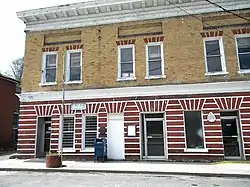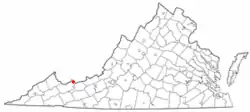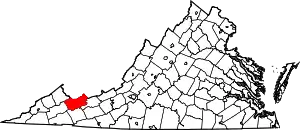Pocahontas, Virginia
Pocahontas is a town in Tazewell County, Virginia, United States. It was named for Chief Powhatan's daughter, Pocahontas, who lived in the 17th-century Jamestown Settlement. She married John Rolfe, and they were among the ancestors of many of the First Families of Virginia.
Pocahontas, Virginia | |
|---|---|
 Pocahontas, Virginia Post Office | |
 Location of Pocahontas, Virginia | |
| Coordinates: 37°18′18″N 81°20′23″W | |
| Country | United States |
| State | Virginia |
| County | Tazewell |
| Government | |
| • Mayor | Benjamin Gibson[1] |
| Area | |
| • Total | 0.58 sq mi (1.50 km2) |
| • Land | 0.57 sq mi (1.48 km2) |
| • Water | 0.01 sq mi (0.03 km2) |
| Elevation | 2,329 ft (710 m) |
| Population (2010) | |
| • Total | 389 |
| • Estimate (2019)[3] | 353 |
| • Density | 619.30/sq mi (239.14/km2) |
| Time zone | UTC−5 (Eastern (EST)) |
| • Summer (DST) | UTC−4 (EDT) |
| ZIP code | 24635 |
| Area code(s) | 276 |
| FIPS code | 51-63288[4] |
| GNIS feature ID | 1493440[5] |
| Website | http://pocahontasva.org |
The population was 389 at the 2010 census. It is part of the Bluefield, WV-VA micropolitan area, which has a population of 107,578.
History
Jedediah Hotchkiss noticed the coal outcroppings when mapping the area during the Civil War. He later hired Isaiah A. Welch to map the timber and coal resources of the area. Although local residents mined the coal for themselves, they were afraid it would give out if actively mined. However, the Nelson Coal Bank which was mined was thirteen feet thick.[6]
A railroad spur line constructed to Pocahontas helped start this region's coal boom in the late 19th century. The Norfolk and Western Railway (now Norfolk Southern) became nationally prominent during the 1880s. The Pocahontas large, two-state coal region was named after this town. The town reached its peak of population in 1920 and has declined markedly since 1960.
The Pocahontas Historic District and Pocahontas Mine No. 1 are listed on the National Register of Historic Places.[7]
Geography
Pocahontas is located at 37°18′18″N 81°20′23″W (37.304997, −81.339802).[8]
According to the United States Census Bureau, the town has a total area of 0.6 square mile (1.6 km2), all land.
Demographics
| Historical population | |||
|---|---|---|---|
| Census | Pop. | %± | |
| 1890 | 2,953 | — | |
| 1900 | 2,789 | −5.6% | |
| 1910 | 3,561 | 27.7% | |
| 1920 | 3,775 | 6.0% | |
| 1930 | 2,293 | −39.3% | |
| 1940 | 2,673 | 16.6% | |
| 1950 | 2,410 | −9.8% | |
| 1960 | 1,313 | −45.5% | |
| 1970 | 891 | −32.1% | |
| 1980 | 703 | −21.1% | |
| 1990 | 513 | −27.0% | |
| 2000 | 441 | −14.0% | |
| 2010 | 389 | −11.8% | |
| 2019 (est.) | 353 | [3] | −9.3% |
| source:[9] | |||
As of the census[4] of 2000, there were 441 people, 190 households, and 122 families residing in the town. The population density was 729.1 people per square mile (283.8/km2). There were 230 housing units at an average density of 380.3 per square mile (148.0/km2). The racial makeup of the town was 96.15% White, 2.04% African American, 0.23% Native American, 0.91% from other races, and 0.68% from two or more races. Hispanic or Latino people of any race were 1.81% of the population.
There were 190 households, out of which 27.9% had children under the age of 18 living with them, 45.3% were married couples living together, 16.8% had a female householder with no husband present, and 35.3% were non-families. 32.6% of all households were made up of individuals, and 14.7% had someone living alone who was 65 years of age or older. The average household size was 2.32 and the average family size was 2.98.
In the town, the population was spread out, with 24.7% under the age of 18, 8.6% from 18 to 24, 21.1% from 25 to 44, 27.7% from 45 to 64, and 17.9% who were 65 years of age or older. The median age was 41 years. For every 100 females, there were 89.3 males. For every 100 females age 18 and over, there were 82.4 males.
The median income for a household in the town was $22,917, and the median income for a family was $30,357. Males had a median income of $22,232 versus $17,321 for females. The per capita income for the town was $12,124. About 19.8% of families and 17.9% of the population were below the poverty line, including 18.4% of those under age 18 and 10.3% of those age 65 or over.
Attractions
The Town of Pocahontas owns and operates the Pocahontas Exhibition Mine and Museum, a National Historic Landmark and Virginia's official "coal heritage zone." The "show mine," as many locals call it, features tours from retired coal miners into the historic mine that served as the birthplace of the world-famous Pocahontas #3 coal. This was used to heat homes across the United States and was the chosen fuel of the United States Navy. The exhibition mine, open from April–August annually, features a 13-foot-tall (4.0 m) coal seam. There is also a museum and education center located in the mine's former powerhouse.
The town also has a registered Virginia Historic site, which is the Pocahontas Cemetery. The cemetery features graves that are more than 100 years old. It includes the mass grave of coal miners killed in a mine explosion in Pocahontas on March 13, 1884.
The town is also home to St. Elizabeth's Roman Catholic Church, which features ten life-sized murals on the ceiling and walls of the church. It was built by Hungarian immigrants who came to work in the coal mines. The church holds an annual Hungarian cabbage roll dinner to honor the European heritage of workers in the coalfields.
At 7p.m. on the last Saturday in April, a candlelight ceremony is held at the Historic Pocahontas Cemetery for the 114 miners killed in the 1884 "mine explosion". Each May the town partners with DMME to open the Exhibition Mine with a safety day which features a mock explosion/rescue. Along with self guided tours.
Pocahontas celebrates July 4 with a fabulous fireworks celebration.The combination of a small town atmosphere, street dance, bands, food truck, and sparklers for the children provides for a unique experience.
Each Labor Day, Pocahontas is home to the Coal Miners Reunion. Retired coal miners and railroad workers from across the State are honored here by a parade and luncheon. The festival also includes special recognition of the oldest, youngest, and longest-serving miners or railroad workers present, and (politics)|stump speeches]] from local political candidates.
The first Saturday in October each year the Annual 'Peeled Chestnut Mountain' Pumpkin Festival kicks off at 7a.m. with a pancake breakfast at the Methodist Church. The streets are lined with all types of vendors ie: crafts, jewelry,art,food,flea market. Features Live Music all day along with a Car Show that any year,make or model can take part in. The annual Pocahontas Indian Run, a five-mile run through the historic town and scenic community that attracts runners young and old. The event also features a three-mile Indian Walk and a Papoose Run for children aged 6–12.
Government
The Town of Pocahontas has a mayor/council form of government. The mayor is elected and serves as the town manager. The current mayor is Benjamin A Gibson.
The Town of Pocahontas also operates a water treatment plant and distribution system for the town and surrounding communities in both Virginia and West Virginia. In 2009 and 2013 the Virginia Department of Health awarded the Town with a Bronze Water Performance Award (3rd place in the State of Virginia) for excellence in granular media filtration. In 2011 the West Virginia Department of Health recognized the Town for their efforts taken to protect its source water and safeguard the public.
In 2006, the town made history when it elected an all-female administration.
Recent development
The Pocahontas State Correctional Center was completed in the summer of 2007, and officially opened on September 5, 2007. The medium-security prison can house around 1,000 inmates.
Future development
Plans were made to develop a "tourist train" to operate between nearby Bramwell, West Virginia in Mercer County and Pocahontas but never came to be.
The Virginia Department of Housing and Community Development awarded the Town of Pocahontas with a $1,000,000 grant to help fund their downtown revitalization. In 2012 Thomas Burns Childress, filed a lawsuit on behalf of Historic Pocahontas, Inc. to preserve buildings slated for demolition and redevelop them instead. The lawsuit stopped the revitalization project, which was never completed. In 2016 the lawsuit was dismissed, as one of the historic buildings had deteriorated for public safety after much of the building had caved in. The money which would have helped the town with their tourism focus in cleaning up the derelict buildings was lost.
The Pocahontas ATV Spearhead Trail System was opened in 2014, and will be connected to the Hatfield and McCoy trail system in West Virginia. It has provided an economic boost for the small town.
The Virginia Department of Transportation awarded the town funding to complete a walking trail which links the Pocahontas Exhibition Coal Mine to the Laurel Meadows Park. The park has also undergone a renovation and is available for rental by the community.
Pocahontas Exhibition Mine has undergone a multimillion dollar renovation. And will reopened May 2020. Renovations included adding a new restaurant in the old education room, new lighting, water, septic, and much more. 2018 Dollar General opened a store in town. Other new business are moving in as well. There are two large cabin rental companies that host ATV riders in the area. Several bed and breakfasts and other lodging establishments have also opened.
Representation in other media
Pocahontas was the setting and filming location of the 1992 film, The Turning, starring Gillian Anderson, Academy Award nominee Tess Harper, Karen Allen, Michael Dolan, and Raymond J. Barry. It was written and directed by L.A. Puopolo, and co-written by Chris Ceraso, the author of the play Home Fires Burning, which was the basis of the film. Scenes were filmed in various locations in Pocahontas, and in the neighboring communities of Abbs Valley, Virginia and Nemours, West Virginia. The drama's plot is based on a Neo-Nazi who returns to his hometown of Pocahontas, where he finds his family dissolving and decides to take action to help them.
Notable people
- Herman Branson, physicist
- Frank Oceak, professional baseball player and coach
- Frank Soos, author[10]
- Zollie Toth, professional football player
- Teddy Weatherford, jazz pianist
References
- http://pocahontasva.org/message-from-the-mayor/
- "2019 U.S. Gazetteer Files". United States Census Bureau. Retrieved August 7, 2020.
- "Population and Housing Unit Estimates". United States Census Bureau. May 24, 2020. Retrieved May 27, 2020.
- "U.S. Census website". United States Census Bureau. Retrieved 2008-01-31.
- "US Board on Geographic Names". United States Geological Survey. 2007-10-25. Retrieved 2008-01-31.
- Fisher, Terri L., and Kirsten Sparenborg. "Pocahontas, Tazewell County" In: Lost Communities of Virginia. Earlysville, Va: Albemarle Books, 2011. Page 204.
- "National Register Information System". National Register of Historic Places. National Park Service. July 9, 2010.
- "US Gazetteer files: 2010, 2000, and 1990". United States Census Bureau. 2011-02-12. Retrieved 2011-04-23.
- "Population Finder: Pocahontas CDP, Virginia". U.S. Census Bureau. Archived from the original on 2020-02-10. Retrieved 2012-10-26.
- "Fishing the Northwest". google.com. Retrieved July 31, 2016.

